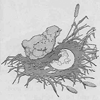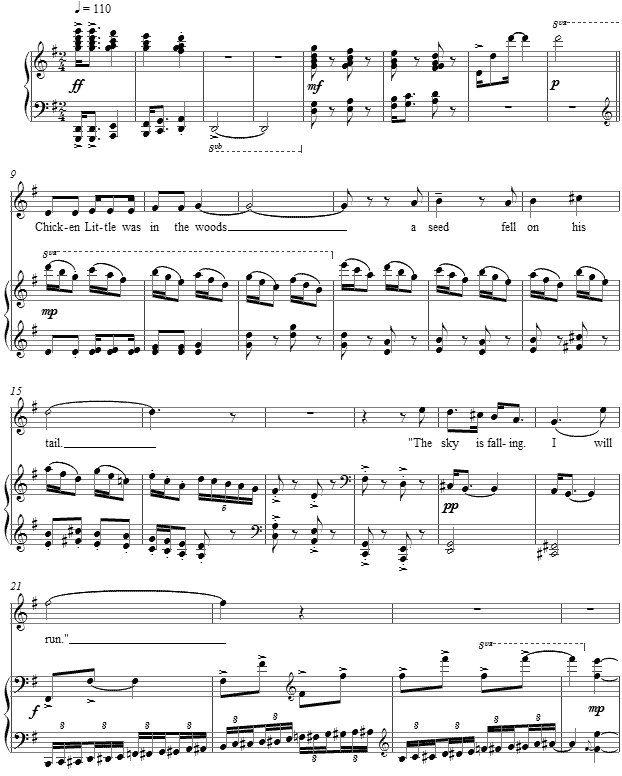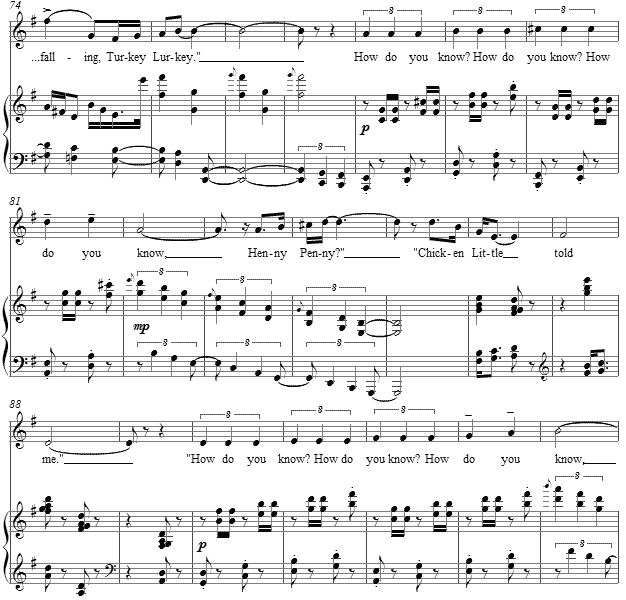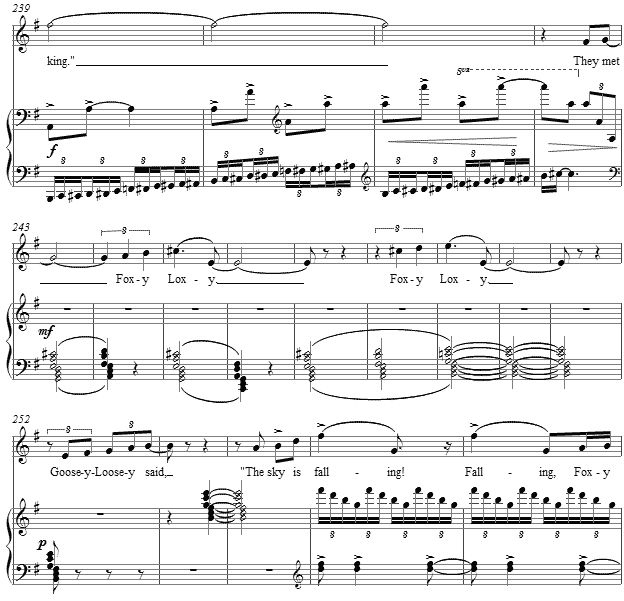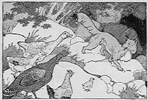Music and Texts of GARY BACHLUND
Vocal Music | Piano | Organ | Chamber Music | Orchestral | Articles and Commentary | Poems and Stories | Miscellany | FAQs
Chicken Little - (2007)
Margaret Free and Harriette Taylor Treadwell
originally for high voice and piano
Chicken Little was in the woods.
A seed fell on his tail.
Chicken Little said,
"The sky is falling.
I will run."
Chicken Little met Henny Penny.
He said,
"The sky is falling, Henny Penny."
Henny Penny said,
"How do you know, Chicken Little?"
Chicken Little said,
"Some of it fell on my tail."
"We will run," said Henny Penny.
"We will run and tell the king."
They met Turkey Lurkey.
Henny Penny said,
"The sky is falling, Turkey Lurkey."
"How do you know, Henny Penny?
"Chicken Little told me.
"How do you know, Chicken Little?"
"I saw it with my eyes.
I heard it with my ears.
Some of it fell on my tail."
Turkey Lurkey said,
"We will run.
We will run and tell the king."
They met Ducky Lucky.
Turkey Lurkey said,
"The sky is falling, Ducky Lucky."
"How do you know, Turkey Lurkey?"
"Henny Penny told me."
"How do you know, Henny Penny?"
"Chicken Little told me."
"How do you know, Chicken Little?"
"I saw it with my eyes.
I heard it with my ears.
Some of it fell on my tail."
Ducky Lucky said,
"We will run.
We will run and tell the king."
They met Goosey Loosey.
Ducky Lucky said,
"The sky is falling, Goosey Loosey."
"How do you know, Ducky Lucky?"
"Turkey Lurkey told me."
"How do you know, Turkey Lurkey?"
"Henny Penny told me."
"How do you know, Henny Penny?"
"Chicken Little told me."
"How do you know, Chicken Little?"
"I saw it with my eyes.
I heard it with my ears.
Some of it fell on my tail."
Goosey Loosey said,
"We will run,
We will run and tell the king."
They met Foxy Loxy.
Goosey Loosey said,
"The sky is falling, Foxy Loxy."
"How do you know, Goosey Loosey?"
"Ducky Lucky told me."
"How do you know, Ducky Lucky?"
"Turkey Lurkey told me."
"How do you know, Turkey Lurkey?"
"Henny Penny told me."
"How do you know, Henny Penny?"
"Chicken Little told me."
"How do you know, Chicken Little?"
"I saw it with my eyes.
I heard it with my ears.
Some of it fell on my tail."
Foxy Loxy said,
"We will run.
We will run into my den,
And I will tell the king."
They ran into Foxy Loxy's den,
But they did not come out again.[ 14 pages, circa 7' 00" ]
The Primer, 1910 cover
The Primer was a graded text for young readers, by Margaret Free, a primary school teacher at Forestville School in Chicago (circa 1898) and Harriette Taylor Treadwell, the principal of West Pullman School in Chicago (no dates given), with illustrations by Frederick Richardson, published in Evanston, Illinois, by Row, Peterson & Company, 1910. Among the stories were included "The Little Red Hen," "Three Billy Goats Gruff," and the story above, which I recall from my own childhood for this sweet book was also a part of our household and grateful memories from my childhood.
Given the alarmism [ 1 ] trumpeted about so many "modern" issues, such as global warming (which has been recycled between instances of its opposite, global cooling, as I read in the science digests of the 1970s), the agonized cries about continuing medical crises, and social upheaval of so many sorts, I thought back to this character and the lessons of a little tale of an easily panicked chicken written for children. The story is often titled "The Sky is Falling," but I preferred to give it the title of the seminal character in the story, and ultimate cause of loss for many, "Chicken Little."
Chicken Little in an illustration by Frederick Richardson (1862-1937)
Why such an ending to this story, in which the gullible gaggle of fowl are merely food for the wily fox? Because lessons were meant to armor a child against many human foibles. Among them is the "madness of crowds" or mob rule. "Terrible" stories for children are meant to instruct, and the modern trend to withdraw such stories from education are ultimately foolish. Bruno Bettelheim wrote than meaning is wrenched from experience by struggling against overwhelming odds, and "this is exactly the message that fairy tales get across to the child in manifold form: that a struggle against severe difficulties in life is unavoidable, is an intrinsic part of human existence -- but that if one does not shy away, but steadfastly meets unexpected and often unjust hardships, one masters all obstacles and at the end emerges victorious." [ 2 ]
In the case of "Chicken Little," the fowl are not victorious, but the Fox is. The winner in this retelling of life's competition is the character which finds an advantage over those who were caught up in group hysteria, which the story specifically proposes was unfounded. It is the fox which wins a horrid advantage over the foolish fowl, all of whom believed something not proven true.
tessitura for high voice
The structure of the musical setting follows the tale's form. There is the first and very simple exposition of Chicken Little's eventually fatal error. The simple "falling" gesture, from the perspective of the top voice, is the same set of notes which so admirably spell a theme from Wagner's Parsifal or a movement from a Brahms symphony. As the voices collapse in on one another, we see a visual and aural metaphor for a commonality in life. Opposite motion in musical structures is so often recommended, but "opposite motion" is also recommended as one marches to the beat of a "different drummer." [ 3 ] Another metaphor might suffice for the collapsing gesture as the space between top and bottom of the accompaniment diminishes, much as the hysteria of the fowl diminishes their judgment. The "run" as Chicken Little decides to "run and tell the king" is a rising chromaticism within the bright major tonic.
The oft-repeated question, "how do you know," is captured in a triple against duple gesture, in which the word stress shifts with each repetition.
How do you know? / How do you know? / How do you know?
Given how often popular delusions -- including the most recent wherein self-proclaimed "brights" accuse others of "delusion" -- are often not adequately discussed in public forums, the ad hominem attack being one sure way of avoiding the risk of being proven incorrectly informed, simply mistaken or overtly manipulative and disingenuous. Each character demands to know, "How do you know," as the referential chain returns to the original and fatally false conclusion of Chicken Little.
The detachment and filigree of the various musical gestures gives way to a solid, polychordal half note gesture as the fox enters the story. It is Foxy Loxy who is not convinced by the mass hysteria, and finds such hysteria a marvelous tool to "extract" value from the hysteria in the form of a good meal. Those who have historically profited from mass hysterias are easily documented. As Charles Mackay further informs us, such hysterias are "moral delusions."
He writes, "Popular delusions began so early, spread so widely, and have lasted so long, that instead of two or three volumes, fifty would scarcely suffice to detail their history. The present may be considered more of a miscellany of delusions than a history,—a chapter only in the great and awful book of human folly which yet remains to be written, and which Porson once jestingly said he would write in five hundred volumes! Interspersed are sketches of some lighter matters,—amusing instances of the imitativeness and wrongheadedness of the people, rather than examples of folly and delusion."
In part, the story of Chicken Little is a warning to successive generations of children and childish adults alike, that there is "human folly which remains to be written...."
During World War II, Walt Disney released an animated short in which the fox was seen to quote from Adolf Hitler's Mein Kampf. Whatever version of the story is told, the end of the tale is that a character triumphs while another loses. In Free and Treadwell's text as in Richardson's illustration, the fox "wins," as Chicken Little's mistaken judgment and resultant mass hysteria brings an end to all of Chicken Little's friends. Where skepticism and individual critical thinking was required, there was only "consensus." The votes through a democratic election and following Putsch brought Hitler to power in such a "consensus," as one saw in many other revolutions of the twentieth century, each with its own set of apologists willing to explain, rationalize and argue for such a consensus because some "Chicken Little" told them.
The score for Chicken Little is available as a free PDF download, though any major commercial performance or recording of the work is prohibited without prior arrangement with the composer. Click on the graphic below for this piano-vocal score.
NOTES
[ 1 ] A quote from Charles Mackay, LL.D., (1814-1889) serves to instruct in this regard. Mackay was a Scottish poet, journalist, and editor was best known in his day for his verses, some of which were set to music. His book, Memoirs of Extraordinary Popular Delusions, was first published in 1841 [London: Richard Bentley, New Burlington Street, Publisher in Ordinary to Her Majesty], with a promise of additional material "should these be favorably received." A second edition was substantially revised, in two-volumes and published in 1852 (London, Office of the National Illustrated Library, 227 Strand). Mackay writes:
"In reading the history of nations, we find that, like individuals, they have their whims and their peculiarities; their seasons of excitement and recklessness, when they care not what they do. We find that whole communities suddenly fix their minds upon one object, and go mad in its pursuit; that millions of people become simultaneously impressed with one delusion, and run after it, till their attention is caught by some new folly more captivating than the first. We see one nation suddenly seized, from its highest to its lowest members, with a fierce desire of military glory; another as suddenly becoming crazed upon a religious scruple; and neither of them recovering its senses until it has shed rivers of blood and sowed a harvest of groans and tears, to be reaped by its posterity."
It is instructive to place this quote in its historical perspective to glean further wisdom from it. Written between 1841 and 1852, it predates the massive hysteria which brought about socialism in its many forms (including Germany's National Socialism, the USSR's imploded Soviet Socialism, the massive failures and destruction of Communist China's "cultural revolution," Pol Pot's Cambodian genocide, the Arab socialism of the Baath Party, along with many other world tragedies such as the Rwanda massacre, the ongoing viciousness in Dafur which the United Nations seems intent on not solving, and so many more examples that the history of the "modern" era has yet to digest lessons well known and regularly taught from the time of fairy tales anonymously written and shared, such as the Grimm brothers collected, and those which followed thereafter, such as Hans Christian Anderson, Tolkien, Saki, and even this "Chicken Little" by Free and Treadwell.
[ 2 ] p. 8, The Uses of Enchantment, the Meaning and Importance of Fairy Tales, Bruno Bettelheim. New York, Vintage Books, 1989. Bettelheim also noted that "Fairy Tales are more than true; not because they tell us that dragons exist, but because they tell us that dragons can be beaten."
In this way one may see just how radical and subversive the world's many fairy tales have been, and why the few and repetitive modern tales of the cultural Marxists pale in comparison. Oppression is not the only tale, but it is a tale of Chicken Little, whose alarmist cries bring many into the lair of Foxy Loxy, from which they all did "not come out again."
There is most assuredly a lesson here, applicable in all ages and times. It is a lesson which children should learn and adults need review. Gathering people together to enter a place of no return is a tale of our time. For one horrid example from this world, see: I'm gonna guide you to the promised land
- a story quite like others.
[ 3 ] Henry David Thoreau's statement in Walden (1854): "If a man does not keep pace with his companions, perhaps it is because he hears a different drummer."

